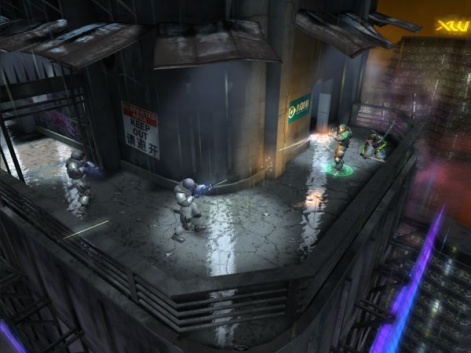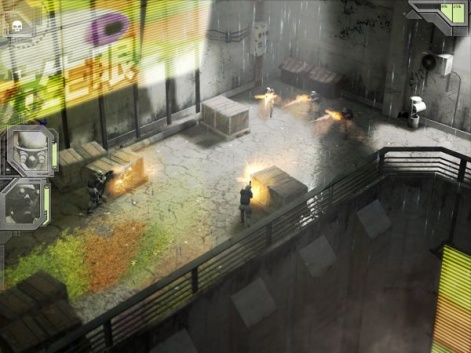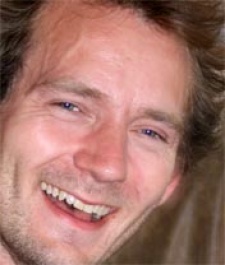Charles Hinshaw, meanwhile, is a Unity veteran who's served in a range of roles from software developer to creative director over the past five years.
But now, both Hinshaw and Francis have left the company they helped turn into one of the most popular 3D game engines around, and they're doing so to make games of their own.
The duo is now operating under the name Framebunker, working out of Copenhagen on their first game Static Sky.
The cyberpunk title promises "the gameplay mechanics of XCOM and Diablo, with the beautifully rendered rain swept cityscapes of Bladerunner and classic neo-noir fiction."
To find out more about Static Sky, Framebunker and why you'd leave one of the top game development tools out there, we caught up with the Francis and Hinshaw for a chat.
Pocket Gamer: Could you introduce us to Framebunker and to Static Sky?
Nicholas Francis: That's really nice that to hear someone that doesn't start out with "so why did you leave Unity?"
Don't worry, that's coming
NF: [laughs] I'm sure it will. So Framebunker is a newly-started studio that currently exists as two co-conspirators.
There are these games that we've been wanting to play for a long time and talking about forever, saying "somebody should really make these games." Somehow, nobody seems to have done that, so we said okay, guess we'll have to make them ourselves.
Right now, for the first game, and probably the first couple of games, we're very cyberpunk themed, because whenever I play a cyberpunk game, first I get really nervous that they've taken all the good ideas, and then I get really annoyed that they haven't.
So now we're going to try to make something like that Static Sky.

An early screenshot of Static Sky
In announcing Static Sky, you talked about tablet games and said that most are "utterly forgettable." What did you mean by that?
NF: Tablets are technically very similar to mobile phones, and you can basically run a cellphone game on a tablet. And some people are just porting phone games over to tablets.
Phone games, with their smaller screen and form factor, lend themselves very well to Temple Run and this sort of thing. A lot of this has been brought over to tablet, but I think you can make some deeper experiences if you say "we're making tablet games."
Charles Hinshaw: There are good games, and then there are games that, twenty years later you'll still remember and talk about. You'll go home and download an emulator and spend the rest of the night playing this game.
It's partially a result of tablets taking mobile content, it's partially that this sort of App Store mentality of making safe games designed to maximise the number of players.
But these things combine to make it so that there may be good games and fun games on tablets, but there aren't a lot that will make you want to download an iPad emulator to play them in twenty years time. I just don't see that happening.
It's not an intrinsic weakness of the platform. I think that tablets themselves are a fascinating opportunity to create really great games.
Between the size and the multi-touch interface, it combines to create something that's . the opportunities for making innovative, memorable play, are probably unprecedented.
It's a new platform, it's a platform that's pulled with it, maybe I'm hesitant to say bad habits, but it's pulled some aspects from mobile gaming that don't necessarily lead to great games.
And that combination has made it so that these kind of unforgettable games have been few and far between. We're really setting out to try to focus these.

Are there any existing tablet games you think will be remembered in years to come then?
CH: That's really hard I think a game that I will probably remember in I'm really bad at this, because the games I obsess over on tablets tend to be almost counter-examples to my point
I think that Sword & Sworcery is a game I will probably remember years from now, and ironically, I think I played it mostly on my phone. But it's a game that actually intentionally took some risks and didn't commoditise itself.
NF: I guess that's something else. I mean, tablets are a very new platform so a lot of people have been asking, how can we get many many players?
That leads to, not necessarily dumbing down the game, but perhaps simplifying it and it can't be too challenging. I think that's a shame.
Does that mean Static Sky will be very challenging? And how will you go about making it more memorable than the tablet games you see out there right now?
NF: There's various aspects to it, and ultimately it's a balance. I mean, you could describe Civilization and it would sound utterly dull, but all the elements just gel together. Part of it is that all aspects of the gameworld need to be tied into a cohesive whole.
I think also, it will be challenging. We want to target gamers with this, and if that means we lose a bunch of people who aren't used to playing challenging games, that's fine with me.
We also want a good story, and especially with games you have the opportunity to create an incredibly engrossing atmosphere. And especially on tablets, think of those games that start by asking you to plug in headphones so that you can actually be sucked into these gameworlds.
I find that this very rarely happens on smartphone games, largely because of screen size.
So I think there are many different aspects to this, and making an unforgettable game is very much our pie-in-the-sky goal. You'll get to ask us in a year if you think we've actually achieved it and then in five years and ten years . [laughs]
So will Static Sky be built in Unity?
NF: Yeah it will. I'm really proud of Unity and I think it's an awesome tool. It also has the advantage that I've been working on it for ten years and Charles has been working on it for five. We know this thing.
I mean, I wrote its first graphics engine. I know every single aspect of it and can go in and hack stuff. We can take the editor and bend it to our will like very few people, so we can be incredibly efficient. We think that just makes sense for us.
So, returning to where we started why leave Unity? Why move from this hugely popular engine to game development?
NF: It's not as though there's one big reason, but I felt a bit restless. I sort of began feeling miserable. My team didn't deserve to have some old fart who had kind of signed out, so I thought, "What shall I do?"
So I tried the Occulus Rift, and I thought, this is so amazing and fantastic. I thought I'd sit down for a week and try to do a game for the Occulus Rift.
I never got very far with it because I got tied up in these weird rendering details, but I was having so much fun. I was really enjoying myself and I thought, wow, I have to go back and study math. I haven't needed that in years. It was so good.
It was just so much fun. So all these games that I've always wanted to play and always wanted to make, well, there's no time like the present. It felt like now was the time, because you don't know how many tomorrows you've got.
CH: I guess there's this envy aspect that builds when you're at a tools company too, right? When you're at Unity and you're building this engine, you're watching people make amazing games with this tool that you're making.
You're proud of what you're making, but you're also a little bit jealous of them. You're there building hammers and watching people make amazing things with them at some point you'll want to become a bit of a carpenter yourself.
That's really the driving motive for doing this.
NF: It's funny, because that's also how Unity started. We wanted to make games,, but there just wasn't any engine that was even remotely suitable for us, so we had to make our own. Later on, that turned into Unity.
In a way, it's all gone full-circle.
In announcing Static Sky, you made reference to core PC and console games such as XCOM and Diablo. So who is the target audience for Static Sky and Framebunker more generally?
NF: It will be gamers who really appreciate a challenge, who actually want to get engrossed in something. It's not the Temple Run players.
At the same time, it's also people who have a hard time etching out the time to complete a 50-hour console experience, where they have to get everyone out of the living room in order to play. I find that myself I really enjoy it when that happens, but I probably only manage it twice a year.
It's people who grew up playing games, but have a bunch of other stuff in their lives. They can't bend their lives to fit their gaming habit, it has to be the other way around.
So we want to take these more involved experiences, and make something that goes towards that, and moulds it into something that fits around modern life.
CH: It's something where we can't actually say, we need to take this deep experience and translate it literally onto a tablet though, because the way that people are consuming is very different. We're citing these games as influences, and being fairly direct and open about that, but it's not just mechanics that don't translate.
It's that when you're walking around and your gaming experience is this tablet this little bubble that you bring up around, rather than this big bubble in your living room than you can go into you have to consider how the length of play and depth of play per session and how those sessions tie together to make a longer thing, how that will change.
So we're giving a lot of consideration to what is the essential experience of those games we view as formative games and what that means on a tablet.
So how do you plan to monetise your games?
NF: We don't have anything too concrete. Partly it's that the world has changed so fast around monetisation, and I don't want to be one of those game designers that takes a business model and then designs a game around that that's just not the kind of game I want to be making.
I can also see that the traditional console game, where you pay a large sum up front, and that's it that makes sense when you have distribution costs involved, but when you don't, that changes the picture completely.
So we're not quite sure about this. It'll be a mixture of various models, I think, and we'll figure it out as we go along. I want a lot of people to enjoy this game, and if we're not going to make any money anyway, I'd rather have them play the game.
Of course, I'd also like to be paid, so we can actually make another game [laughs].
If you go to a console game, there's this assumption that your production values are quite high and you've made a long experience, but with tablets, you don't have that, which means you can take more chances with your game design and actually make a niche game rather than something that's going to appeal to everyone.
We're not looking to build out this big studio. We want a small group of really talented people, who want the same things most of the time but completely different things some of the time, so we can create something really interesting together.
I think tablets are good for that, because if you get a really great five-hour experience from a tablet, that's fantastic. If you did that on a console, people would be complaining about that.
Does that mean you'll be launching Static Sky as a product with a defined length rather than an evolving service with lots of replayability?
NF: That's definitely how I see it at the moment. It might turn out that once we have the gameplay, we see that it would work in a multiplayer environment, and allow players to play each other forever.
If that lends itself to it, we'll definitely consider rolling that out, saying "this can be our version 1.5".
But right now we're thinking we actually want to have a story. We want to have gameplay where we construct these 'moments of awesome'. And you can do that in multiplayer games, but it's a somewhat different proposition, as I see it.
But we've only been in production for a month, so we're trying not to tie ourselves down too much. If something fantastic emerges, we'll go explore that.
And what's the planned release date for Static Sky?
NF: We're aiming for a one-year development cycle. Anything longer than that well I just can't plan my life that far ahead.
We want to have time to engage with the community and have them try a version perhaps. We could find out what they like and don't like and make changes based on that. That could take a while.
So we're thinking a year's development cycle from today. Then we'll see
I mean, if it turns out to be really fun after two months, we'll ship it. If after a year, we've built this big game and it really sucks, then we won't.
Thanks to Nicholas and Charles for their time.





















